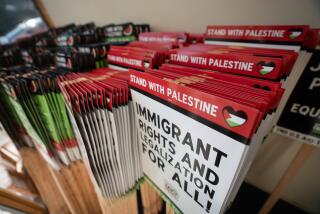Baker Challenges Soviet Latin Policy : Warns Moscow Not to Export Arms, Ideology to Central, South America
- Share via
WASHINGTON — Secretary of State James A. Baker III, in a challenge to Soviet President Mikhail S. Gorbachev who visits Havana next week, said Thursday that the democracies of the Western Hemisphere are determined to prevent Moscow and its allies from using Latin America as “a dumping ground for their arms or their failed ideologies.”
Seizing on Gorbachev’s “new thinking” campaign, Baker called on Moscow to apply new ideas to Central America by reducing its $500-million-a-year program of military aid to the Sandinista government in Nicaragua.
Meanwhile, White House Press Secretary Marlin Fitzwater said President Bush has made clear that Soviet restraint in Central America would “have a (favorable) impact in terms of our overall relationship.” Fitzwater said that the U.S. view has been communicated to Gorbachev, who arrives in Havana on Sunday at the start of a three-day visit, but he declined to say how the message was sent.
Baker’s remarks came in a speech to a seminar on Western Hemisphere affairs at former President Jimmy Carter’s Presidential Center in Atlanta. The text was made public by the State Department in Washington.
Tough Rhetoric
His words represented some of the toughest rhetoric that the Bush Administration has directed at the Soviet Union after weeks of conciliatory statements. They underlined the tacit veto that the Soviet Union holds over the Administration’s new bipartisan Central America policy.
The White House and the Democratic-controlled Congress agreed last week on an approach to provide non-military support to maintain the Contras long enough to find out if the Nicaraguan government will conduct free elections, as it has promised to do. A continued flow of Soviet economic and military aid would likely stiffen Managua’s response to the U.S. plan.
Addressing an audience that included many Latin American leaders, Baker said: “Together we must send a clear message to others outside this hemisphere: This is not a dumping ground for their arms or their failed ideologies. We are looking for signs of new thinking. The Soviet Union now has an opportunity to demonstrate it in Central America. This is what the (regional peace) agreement requires and what the democratic community demands.”
Baker also urged the other democracies in the hemisphere to support U.S. efforts to pressure Nicaragua to keep its pledge to move toward genuine democracy. He said that such support is necessary if Central American nations want the United States to end its support for the Contras.
“If you ask the United States to forgo unilateral initiatives and work instead in good faith with the democratic nations of Latin America in a new cooperative diplomacy to support democracy, then we ask you to join with us in good faith to turn the promise of that diplomacy into reality throughout this hemisphere,” Baker said.
“All those who advocate diplomacy and political solutions to the region’s conflicts have a responsibility to prove that this is the best and surest route to achieve our common goals,” he added. “We invite Latin America’s democratic leaders to join us in this challenge.”
The presidents of El Salvador, Costa Rica, Guatemala, Honduras and Nicaragua agreed earlier this year on a regional peace plan calling for free elections in Nicaragua by next February. The agreement also calls for the five nations to develop a specific plan for demobilizing the Contras who are now camped at bases in Honduras.
In his speech, Baker also pledged a continuing U.S. effort to help ease “the weight of Latin America’s foreign debt.” But he emphasized that the Latin nations must also “move forward to take the necessary, but difficult steps to restructure and reform your economies.”
He noted that Treasury Secretary Nicholas F. Brady recently unveiled a U.S. proposal for debt relief, but he said that plan will not work without economic reforms in the debtor nations.
“We must negotiate, case by case, the details of that policy to ensure continued economic reform, a real reduction in existing debt burdens and new capital flows in the future,” he said.
State Department spokeswoman Margaret Tutwiler said that Baker discussed the debt problem with Venezuelan President Carlos Andres Perez on the return flight from Atlanta to Washington. Perez, who attended the Atlanta symposium, is scheduled to confer with Bush on Saturday at the White House.
The President plans to discuss the Central American peace process next week with Alfredo Cristiani, El Salvador’s incoming president and Costa Rican President Oscar Arias Sanchez.
Meanwhile, the State Department sought to refute speculation that Washington plans to modify its tough policy toward Cuba in the wake of the withdrawal of Cuban troops from Angola.
In a memo to all U.S. embassies last week, Baker said that the 28-year-old U.S. trade embargo against Cuba will remain in place.
“Cuba is involved in a public diplomacy effort to reinforce the impression that improved bilateral relations are in the cards,” Baker said. “Better ties--especially with the absence of a comprehensive trade embargo--would benefit greatly the failed Cuban economy and enhance Cuba’s image and prestige.
“The U.S. government is prepared to resolve problems with Cuba whenever U.S. interests can be served,” he said. “But, Cuban statements to the contrary, Cuba has not demonstrated a serious interest in improving relations with the United States.”
Times staff writer Don Shannon contributed to this report.
More to Read
Sign up for Essential California
The most important California stories and recommendations in your inbox every morning.
You may occasionally receive promotional content from the Los Angeles Times.













